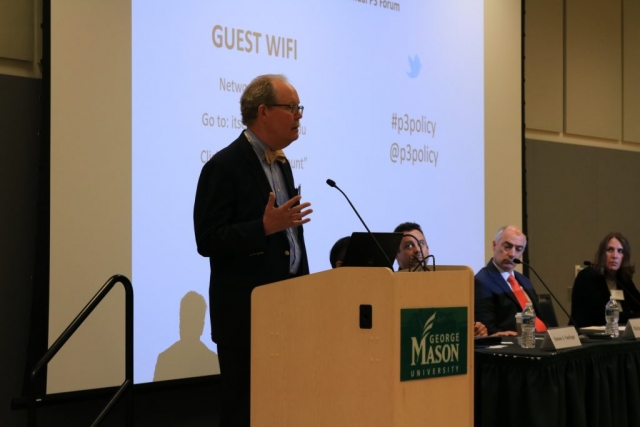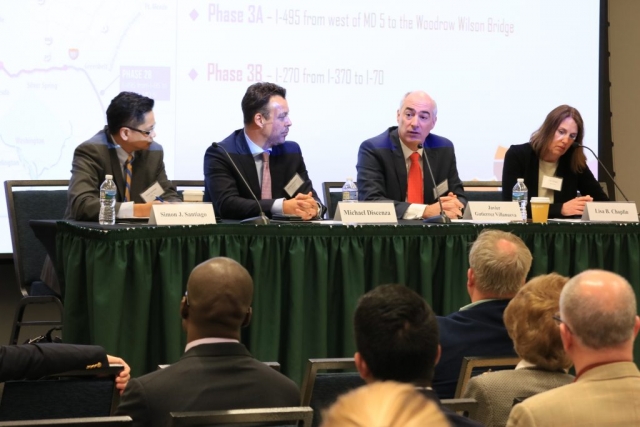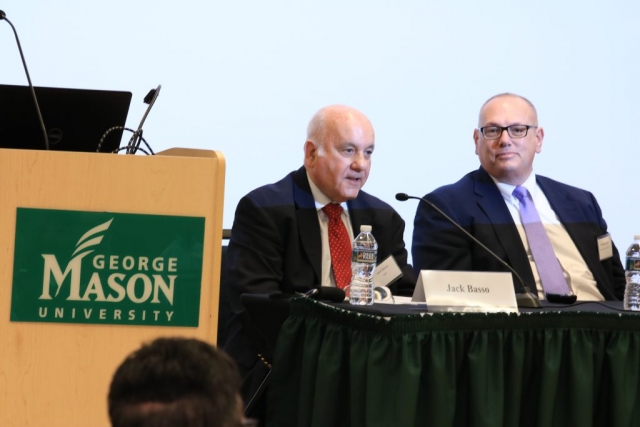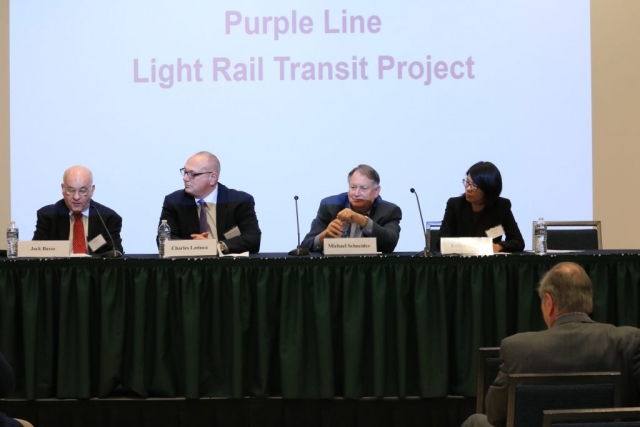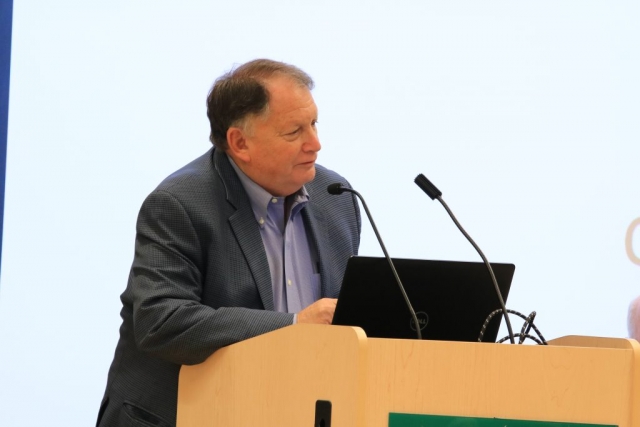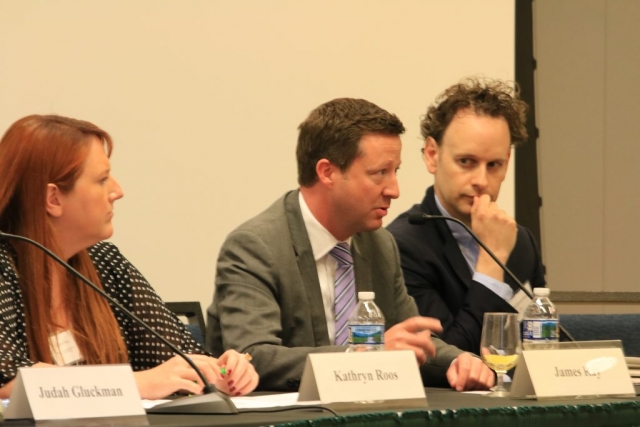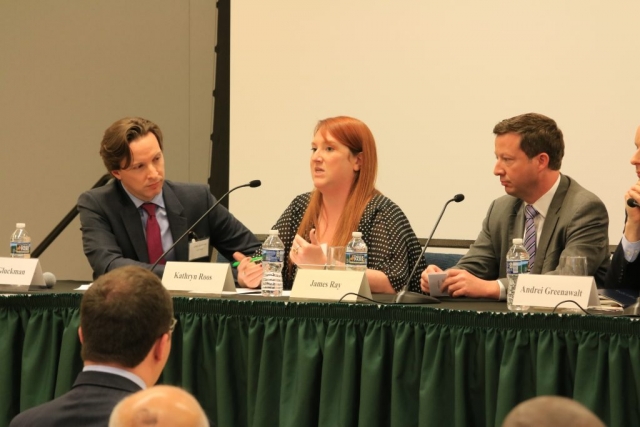On April 23, 2019, the Center for Transportation Public-Private Partnership (P3) Policy at the Schar School of Policy and Government hosted its 5th Annual P3 Forum. The event engaged industry leaders and the academic community with discussions focused on pressing issues surrounding P3 highways, transit, and the future of mobility.
Center Director and Schar School Professor Jonathan Gifford opened the event with brief remarks before turning the proceedings over to Nossaman’s Simon Santiago to moderate the first panel: “Updates on Regional Highway Programs.”
This first panel featured Michael Discenza, CFO of Transurban North America, Javier Gutiérrez, CEO of I-66 Mobility Partners, and Lisa B. Choplin, the Director of I-495 and I-270 within the Maryland Department of Transportation’s P3 Office. The panelists’ case studies highlighted the regional vision for improved mobility and the work being done to improve connectivity and safety in the DC-Maryland-Virginia (DMV) region, stressing how P3 approaches produce public benefits. Mr. Discenza, for example, noted how Virginia’s I-495 and I-95 Express Lanes cases purport to provide vast economic benefits and travel savings, including supporting $6.3 billion in economic activity and an 80-minute average travel time savings across the Express Lane network. Mr. Gutierrez, similarly, stated that when Virginia’s I-66 Outside the Beltway project reaches completion in December 2022, the facility’s express lanes, new bus and transit routes, and expanded park and ride space will provide regional commuters with congestion relief, improved safety, and greater transit and carpooling options. Lisa Choplin discussed Maryland’s developing P3 Program, whose goals include reducing traffic congestion along I-495 and I-270, accelerating new project delivery, and pursuing innovative financing approaches, all at no net cost to the state.
The second panel, “New Models for P3 Transit Delivery,” featured transit P3 projects from across the nation and the world and was moderated by Jack Basso, Former COO of AASHTO and Assistant Secretary of Budget and Programs, USDOT. Charles Latucca, Executive Director of Transit Development and Delivery for the Maryland Transit Administration spoke on the Purple Line, the second transit project to utilize P3 delivery in the United States. The Purple Line has faced a series of setbacks, but Mr. Latucca presented the project as now on track, anticipating 59,500 daily riders following its 2022 completion. Mike Schneider of InfraStrategies, presenting on the Honolulu Rail Transit Project, stressed the need of decision makers to take a stronger look at P3s for transit projects. Honolulu is only the third transit project to use a P3 delivery model, with the first being Denver’s Eagle P3 and the second, Maryland’s Purple Line. Honolulu has utilized a DBF/OM (Design-Build-Finance/Operate-Maintain) approach, which the panelist presented as a new concept in P3 models and one that can have great application in both transit and new mobility services. Closing out the morning speakers was Esther Chiew, PhD, currently consulting for the World Bank’s Railway Station Redevelopment Program. Rail stations are turning to P3s internationally to integrate real estate, retail, and transportation expertise and thereby bridge revenue gaps. According to Chiew, rail station redevelopment is important because it “can bring about various benefits for residents, the city, and the railway” by improving community access to services and instilling pride, since stations can provide the “symbol and identity of a city.”
During lunch, after an introduction from Center Program Manager and Schar School PhD Student, Lauren N. McCarthy, Robert Poole of the Reason Foundation spoke about the future for DBFOM (Design-Build-Finance-Operate-Maintain) P3 highway projects. Addressing what the industry should expect over the next few years, he stated what he sees as the three best opportunities: adding express toll lanes to congested freeways; replacing major bridges; and rebuilding and modernizing aging long-distance interstate highways. Nevertheless, he remained cautious about the future given the current divisive congressional climate.
Following lunch, the Forum closed out a busy and informative day with a panel titled “Smart Mobility and the Potential for P3s,” moderated and organized by Judah Gluckman of Louis Berger, in cooperation with Young Professionals in Infrastructure. The panel explored how jurisdictions such as Washington, DC are thinking about and incorporating innovative mobility services into their transportation and land use planning. Kathryn Roos, P3 Manager for District of Columbia Department of Transportation (DDOT), Andrei Greenawalt of Via, Joe McAndrew of the Greater Washington Partnership, and Jim Ray of Ray Strategies, provided a rich discussion. Topics included the application of P3s for smart mobility; private-sector strategies for partnering with the public sector; the importance of data sharing, management and privacy; and the most impactful issues facing smart mobility in cities in the coming years. The panel suggested that data collection and sharing agreements would present the most pressing issues for all partners, public and private, along with the integration of interoperable trip payment platforms to improve both regional and national access to public transit. In closing comments, Jim Ray warned against “walled gardens” in the smart mobility space, a concept where platforms control their users’ access to content and services, limiting competition. Mr. Ray contrasted such models with how grocery stores place “Pepsi and Coke next to each other,” forcing transparent pricing and information accessibility, benefiting consumers.
Dr. Gifford closed the forum with summary remarks. He reiterated the importance of further discussion and noted how all the panels and speakers provided great insights into the P3 landscape and presented new and interesting ideas for further research and collaboration across the public and private sectors.
——————–
The Center for Transportation Public-Private Partnership Policy, housed within the Schar School of Policy and Government at George Mason University in Arlington, Virginia, is dedicated to advancing the objective consideration of transportation P3s through research, education, and public service. Most recently, the Center’s Evidence Project has explored 9 of 21 U.S. P3 projects to explore how well modern P3s have met their government sponsors’ goals. The Center is exploring options for completing the remaining cases and would welcome your support. Other new research endeavors include: (a) examining how P3 concessions can work with state DOTs to manage and mitigate the impact of downtime on nearby state facilities; (b) assessing how application processes for TIFIA and other credit support programs affect P3 projects; and (c) studying the impact of delivery approach on Dallas/Ft. Worth’s managed lane network. For more information on the P3 Center’s research, please visit p3policy.gmu.edu or contact Jonathan Gifford, Director, at jgifford@gmu.edu.
For a list of speake bios and the agenda see the 5th Annual P3 Forum Agenda
Thank you to all who attended and spoke at the 5th Annual P3 Forum.
